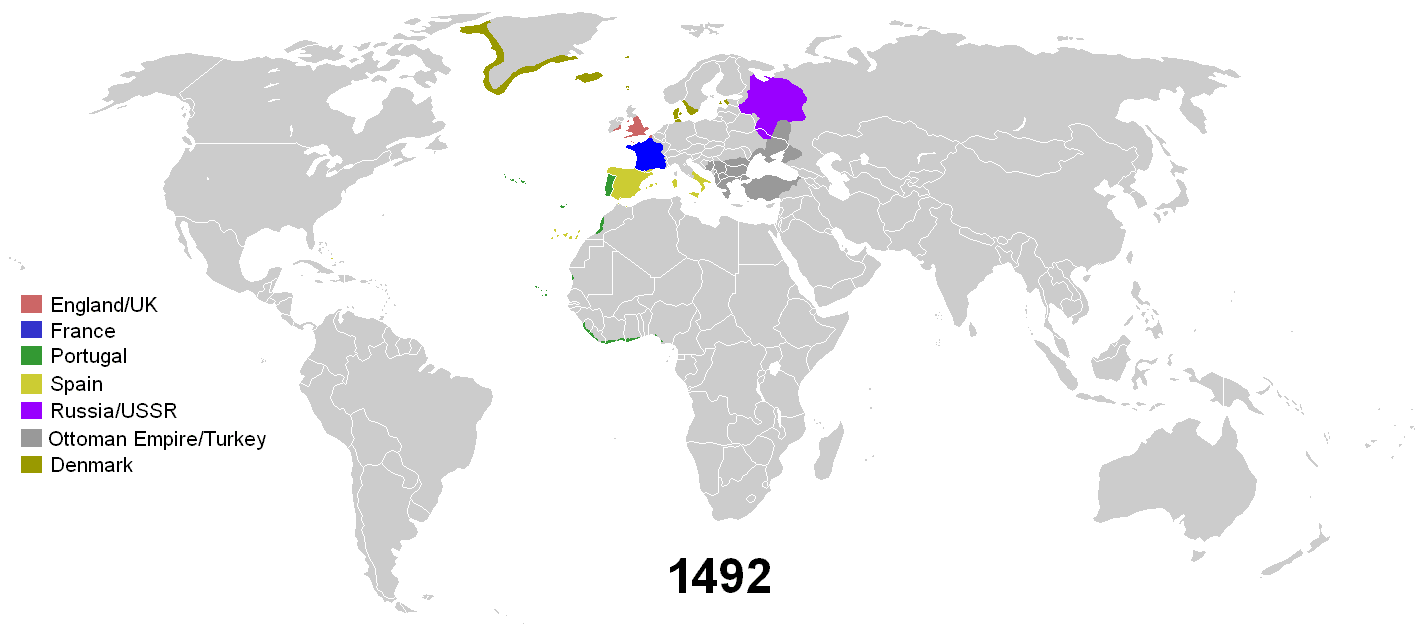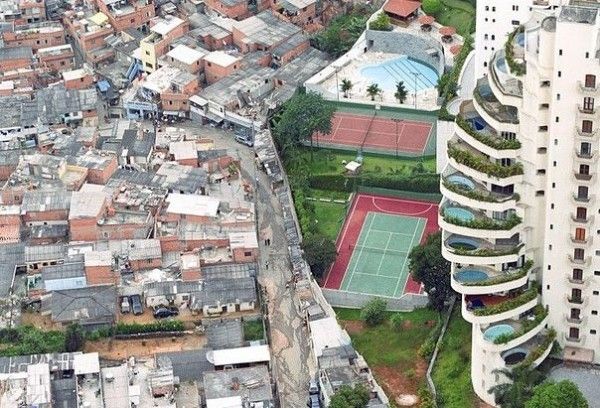PART IV
In this section of our course, I will address the dilemmas of building Nation-states in the Post-Colonial World.
One of the major challenges I face is that it is so difficult to nail down that portion of the world that is not “liberal” (what we used to call the First World) or “Leninist” (old Second World). There is a good reason why this is so. What we often refer to as the “developing world” or the “Third World” is a vast array of different types of countries and civilizations. On the one hand, Americans tend to forget that there are highly developed states outside of the western world. On the other hand, there are fantastically poor states, such as Chad and Sudan. In this sense, there is no unified entity we can call the “Third World.”
My solution to this challenge is to focus on a specific category of states that have at least one thing in common: the experience of having been colonies of European powers. This approach has a notable benefit. Many of the major crises in the world today are at least partly due to the experience of European colonialism. These countries include Iraq and Afghanistan—both places our government is desperate to leave. We are now leaving Syria, and the consequences our former allies, the Kurds–another group once victimized by colonialism–will be severe.
27. LECTURE: Wednesday, October 7
Initial reflections on the contradictions between two ideal types: tradition and modernity.
Today’s Assumption: People in the West frequently denigrate the cultures of the inhabitants of traditional societies. Yet, the norms and institutions of traditional society are as rational as those of modern society.
A good example of liberal democracy’s problem with the expression of traditional ways of acting is the French practice of Laicité
Angelique Chrisafis, “France’s Headscarf Rule,” The Guardian,” July 2013 READ
Yet despite the West’s assumption that its societies are governed entirely by formal rules of order, traditional practices, like political corruption, play an undeniable part in liberal-democratic societies, too.
See Glen Thrush, “If I’m corrupt, it’s because I take care of my district” READ (Until his death in 2010, John Murtha, the subject of this article, had been the longest serving representative in the House of Representatives. Most likely, this was the result of taking care of a lot of people! But whom in particular? Ah…).
In preparation for my lecture on colonialism on Monday, please watch the wonderful film, “Mister Johnson,” on our on-line Hesburgh Reserves site HERE
28. DISCUSSION SECTION: Friday, October 9
Discussion: Finish your discussion of Havel by asking what makes the green grocer revolt. Is Havel’s analysis persuasive? Or when we are dealing with oppressive dictatorships, is it just wishful thinking to expect that the weak will rise up against the strong?
Paragraph Assignment: Identify one example of “living within a lie” in the United States today and specify what would need to happen to make you fight to overcome it.
Your Second Reflective Essay Question is HERE
You have one week to complete it.
29. LECTURE: Monday, October 12
Reflections on the brutal and paradoxical consequences of colonial empires.
Today’s Assumption: In this lecture, I will focus on colonialism’s role as an external instrument of change. Whether we are talking about the realization of Napoleon’s imperial ambitions in Europe or Europe’s colonial conquests of most of Africa and Asia one century later, many fundamental changes in political identity are introduced from outside. Even after colonial powers leave, their impact will be felt for decades and perhaps even centuries thereafter. For example, contemporary conflicts in the Middle East are directly related to the experience of colonization.

Assignment: As you read the following essays, ask yourself whether and in what way the politics of Iraq, Afghanistan, Syria, and Pakistan would have been different without the intrusion of western powers, such as Great Britain and France.

Sykes-Picot line (1916): Creating states at whim
Would they be stable states today? Or, in view of their fractured histories, is this question nonsensical? Are they currently nation-states? If not, can they be transformed into viable nation-states today?
What do these questions tell us about what one might call our “betrayal” of the Kurds, our principal allies in the fight against ISIS?
Readings:
Rudyard Kipling: “The White Man’s Burden” PRINT AND READ
Is this poem an example of satire or imperial pride?
S. V. R. Nasr, “European Colonialism and the Emergence of Modern Muslim States” PRINT AND READ
Robin Wright, “How the Curse of Sykes-Picot still haunts the Middle East,” The New Yorker, April 30, 2016 PRINT AND READ
Bayar Mustafa, “Instability in the Middle East is not the Kurds’ fault” READ (This is a pro-Kurdish article.)
30. LECTURE: Wednesday, October 14
Reflections on the sensible logic of peasant society.
Today’s Assumption: There are more peasants in the world than any other social group. The organization of peasant societies makes more sense than we might imagine. It relies upon a conception of reality known as the “limited good.” The “limited good” is neither good nor bad. It is simple one way of looking at the world.
Assignment: Read George Foster’s seminal article and the newspaper piece below and ask yourself what the advantages and disadvantages of peasant society would be. Do you agree with all of Foster’s claims?
George Foster: “Peasant society and the image of the limited good” PRINT AND READ
Sara Sidner, “Brothers share wife to secure family land” READ
On the rational logic behind primogeniture: READ
Then, read about the massive migration of peasants from the land into the cities, a quintessential example of the conflict between traditional and modern societies.
Eugene Linden, “The exploding cities of the developing world,” Jan-Feb;75(1), 1996: 52-65. Search through JSTOR and PRINT and READ
And why not immigrate permanently to South Bend? It will certainly help my home value.
D’Vera Cohn, “About a fifth of U.S. adults moved due to COVID-19 or know someone who did,” Pew Research Center, July 6, 2020 READ
31. NO DISCUSSION SECTION, Friday, October 16
You are finishing your essays
32. LECTURE: Monday, October 19
Reflections on a global problem—poverty—and its implications for life, society, and politics.

Today’s Assumption: Being poor is a way of life for most people in the world. No student at the University of Notre Dame should be indifferent to the plight of the poor, especially while living on one of the most conspicuously affluent campuses in the world! In addition, poverty is not only a problem for other peoples. It is a problem for Americans as well because it is deeply embedded in our society, indeed arguably to a much greater extent than in any other modern industrial democracy.
Assignment:
For today’s class, please read the first half of Carolina Maria de Jesus, Child of the Dark. De Jesus’s story is painfully revealing. As you read it, try to imagine what you would do if you found yourself in her shoes. Keep in mind that Carolina Maria was a living, breathing human being, just like you; she had nothing–often not even food in her stomach–and she somehow managed to write this incredible diary.
Carolina Maria de Jesus, Child of the Dark.
Ana Swanson, “You might be among the richest people in the world and not realize it” Washington Post READ
33. CLASS VISIT: Wednesday, October 21
A virtual visit by Mary Kate Battle, ND ’10. Mary Kate is a senior development specialist with Catholic Relief Services and, more importantly, a battle-hardened veteran of Introduction to World Politics. To get an idea of what Notre Dame leadership means, please watch these videos: HERE and HERE
Carolina Maria de Jesus, Child of the Dark. Finish the book.
PBS News Hour, “Violence flares in Rio’s slums just months before summer Olympics,” May 31, 2016: WATCH and READ
Gapminder: Look HERE for some of some very cool sources of information. Gapminder is like an interactive game designed to take you through every imaginable data (e.g., live births, literacy rates, income) relevant to comparisons between the developed and developing world. For some of the topics, you can even manipulate the information over time, going back hundreds of years. I could play around with this device all evening.
Jesse McKinley, “Cities deal with a surge in shanty towns” READ
.34. DISCUSSION SECTION: Friday, October 23
She brought forth her firstborn son, and she wrapped him in bands of cloth, and laid him in a feeding trough, because there was no room for them in the inn (World English Bible)
What does this passage entail?
Readings:
What is Carlolina Maria de Jesus’s message to US in Child of the Dark
What is a Roman Catholic’s responsibility to the poor? Leondardo Boff, a key proponent of “liberation theology,” comments: PRINT AND READ
The poverty of voluntourism? READ
The inequality of opportunity in America: WATCH I particularly like the reference to John 3: 17-18.
Can Notre Dame be a truly Catholic institution and not practice liberation theology? What would it mean to practice liberation theology. Interestingly, the preeminent figure in liberation theology, Gustavo Gutiérrez, teaches at Notre Dame! See HERE
Paragraph assignment:
“Can Notre Dame be a truly Catholic institution and not practice liberation theology?”
35. NO CLASS: Monday, October 26
36. LECTURE: Wednesday, October 28
Reflections on the different forms of authoritarian government: Big men with big guns, big appetites, and big mouths.
Today’s Assumption: Western policymakers frequently rationalize life under dictatorial regimes (e.g., Saudi Arabia) as a political necessity. But cozying up to dictators is risky. Can we confidently say that we are the best judges of necessity, especially when we are talking about the quality of other people’s lives? We sometimes forget or ignore the fact–tragically–that ordinary people must live under these regimes.
Assignment: As you read about these regimes, ask yourself these questions: 1) Why would people support them? 2) How can the autocrats live with themselves after doing terrible things to stay in power? and 3) What should we do with them after they are no longer in power?
Patricia Sellers, “What exactly is charisma?” READ
Steve Kolowich, “Why Oprah Could be President” READ
Robert Kagan, “The Strongmen Strike Back, Washington Post, March 14, 2019 PRINT AND READ
37. Discussion Section: Friday, October 30
Topic: How should the US deal with allies who happen to be dictators? Should it punish them for their violations of human rights and other offenses? Or should it instead be “realistic” and, if necessary, choose the benefits of a continued healthy relationship over the potential costs of the pursuit of justice. Read about the response to the murder of the Saudi journalist, Jamal Khashoggi, and then reflect upon the critique of former President Jimmy Carter’s attempt to inject human rights into US foreign policy.
“Jamal Khashoggis death made the Saudi crown prince a pariah. Trump has helped rehabilitate him on the world stage,” Washington Post PRINT AND READ
Sandy Vogelgesang, “Principle’s Price,” PRINT AND READ
Paragraph Assignment: Should the US have punished Saudi Arabia for the prince’s role in the murder of Khashoggi? If so, what should it have done?
